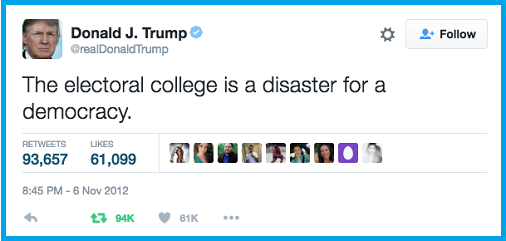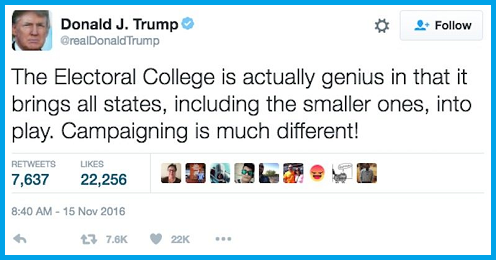|
1824: Andrew Jackson vs John Quincy Adams
Popular Vote Totals: Jackson (153,544) Adams (108,740) William Crawford (40,856) Henry Clay (47,531)
Electoral Vote Totals: Jackson (99) Adams (84) William Crawford (41) Henry Clay (37)
In this election, Andrew Jackson received 44,804 more popular votes than John Quincy Adams and Jackson had the most electoral votes, but he did not receive the required 131 electoral vote majority.
According to the Twelfth Amendment of the US Constitution, when no candidate obtains a majority of electoral votes, the election is decided by the House of Representatives.
The House must choose among the top 3 candidates, by electoral vote totals, who will become President.
Therefore, according to the 12th Amendment, the fourth place finisher, Henry Clay, was automatically eliminated from being selected as President by the House.
Ordinarily, this would have spelled bad news for the political ambitions of Henry Clay.
However, who was the Speaker of the House of Representatives at that time? Henry Clay!
Henry Clay despised Andrew Jackson and Clay held tremendous political influence in the House of Representatives. (He was the Speaker of the House!)
Also, in January, 1825, Adams invited Clay to his house, and they met for several hours.
Although it is not known what was precisely discussed, it is generally believed to be that if Clay used his influence in the House to get Adams elected President, Adams would make Clay his Secretary of State.
What was Clay's reason for wanting this position? The last three Presidents, Thomas Jefferson, James Madison and the current President, James Monroe had all gone directly from Secretary of State to the Presidency. Henry Clay saw this as a great opportunity for becoming President, himself.
Not surprisingly, the House chose Adams to be President of the United States, and Adams selected Henry Clay to be his Secretary of State.
This caused incredible bitterness to be directed against John Quincy Adams. Andrew Jackson and his supporters angrily declared the election of 1824 to be a "corrupt bargain".
In fact this produced so much hatred and contempt toward John Quincy Adams, he only served one term as President and he lost the 1828 Presidential election to Andrew Jackson!
The Electoral College was proposed by the framers of the United States Constitution to allow lower-population states to have a greater influence in Presidential elections. As can be seen, this did not occur in the election of 1824.
1876: Samuel J. Tilden vs Rutherford B. Hayes
The 1876 election was one of the most controversial presidential elections in American history.
Governor of New York, Samuel J. Tilden received 252,666 more popular votes than Rutherford B. Hayes, Governor of Ohio.
Popular Vote Totals Tilden (4,286,808 or 50.92%) Hayes (4,034,142 or 47.92%)
Tilden won 184 electoral votes (needing just one more for a majority) and Hayes received 165, leaving 20 disputed electoral votes in four states. Three states had all of their electoral votes unresolved: Florida (4), Louisiana (8), South Carolina (7) but only 1 of Oregon's 3 electoral votes was disputed.
The Democrats needed just one more electoral vote for the Presidency, but in essence, they were quite willing to relinquish the Presidency in exchange for the end of Reconstruction in the South and returning the South to its antebellum politics. So, they struck a deal with Congress (the Compromise of 1877), which outright gave all 20 electoral votes (and the Presidency) to Hayes. In return, Hayes officially ended Reconstruction and withdrew all federal troops from the Southern states.
Tilden lost the election by one electoral vote and Hayes' detractors referred to him as "Rutherfraud", "His Fraudulency" and called the Compromise of 1877 a "corrupt bargain". (Does "corrupt bargain" sound familiar? See the election of 1824.)
Samuel Tilden, although still considered to be a strong Presidential candidate, chose not to run in 1880 or 1884.
As for the long-term results of this election?
The election of 1876 completely ended the era of Southern Reconstruction.
With less federal pressure on the southern states (particularly with the removal of federal troops), these states passed laws which led to the disenfranchisement of black voters. Other laws were passed which were deliberately designed to separate white and black people in schools, restaurants and so on. These laws remained in effect until the civil rights movement of the 1960's brought these to an end.
1888: Grover Cleveland vs Benjamin Harrison
The 1888 election saw Democratic President Grover Cleveland from New York trying to secure a second term against Republican Benjamin Harrison a former U.S. Senator from Indiana.
Popular Vote Totals Cleveland (5,534,488 or 48.63%) Harrison (5,443,892 or 47.80%)
Cleveland's Popular Vote Lead Was 90,596
In many states, the popular vote was extremely close (about 1%), most notably New York, where the
Tammany Hall political machine was extremely powerful.
When Grover Cleveland was Governor of New York, he fought political corruption especially Tammany Hall.
Now that Cleveland needed the 36 New York electoral votes, Tammany Hall helped deny Cleveland those votes of his home state.
Although Cleveland had the popular vote plurality, his 168 electoral votes to Harrison's 233, made Benjamin Harrison the President.
Due to Tammany Hall's vengeance against Grover Cleveland, the Election of 1888 resulted in Benjamin Harrison's becoming President. Do you think this is what the framers of the Constitution had in mind when they proposed the Electoral College?
In all 3 of these elections, (1824, 1876, 1888) the electoral vote winners (John Quincy Adams, Rutherford B. Hayes, Benjamin Harrison) served only one Presidential term.
In the elections of 1824 and 1888, the electoral vote losers (Andrew Jackson, Grover Cleveland) eventually went on to be elected (or in Cleveland's case, re-elected) President.
In the elections of 2000 and 2016, the electoral vote losers (Al Gore and Hillary Clinton) did not eventually go on to be elected President.
2000: Vice President Al Gore / Senator Joe Lieberman
vs
George W Bush, Governor of Texas / Dick Cheney
Popular Vote Totals Gore (50,999,897 or 48.40%) Bush (50,456,002 or 47.90%)
Gore's Popular Vote Lead Was 543,895 votes.
This election concluded in Florida, where a very narrow difference in electoral votes triggered a mandatory recount as well as additional recounts.
Ultimately this case reached the United States Supreme Court.
Even more recounts were then done, and were closely monitored by the news media. All inconsistencies about "dimpled ballots" and "hanging chads" were reported.
On December, 2000, the Court's controversial decision ended the recounts, thereby awarding Florida's electoral votes to Bush and granting him the Presidency.
George W. Bush won Florida and the Presidency by a slim 537 Florida votes over Al Gore.
On several occassions, when questioned about this legal decision, Supreme Court Justice Antonin Scalia would curtly reply "get over it".
So, once again, due to the Electoral College, we had an election that left a great many people angry about politics, bitter about the Supreme Court and an election that had to be decided by state and federal courts.
Wouldn't things be much less complicated if we didn't have the electoral college?
2016: Hillary Clinton / Tim Kaine, US Senator from Virginia
vs
Donald J. Trump / Mike Pence, Governor of Indiana
Although Hillary Clinton lost the electoral college vote to Donald Trump, she won the popular vote by over 2.8 MILLION.
Popular Vote Totals Hillary Clinton 65,853,516 Donald Trump 62,984,825 votes
Source:
2016 Presidential Election Results
Hillary Clinton's Popular Vote Lead was 2,868,691 votes.


|

